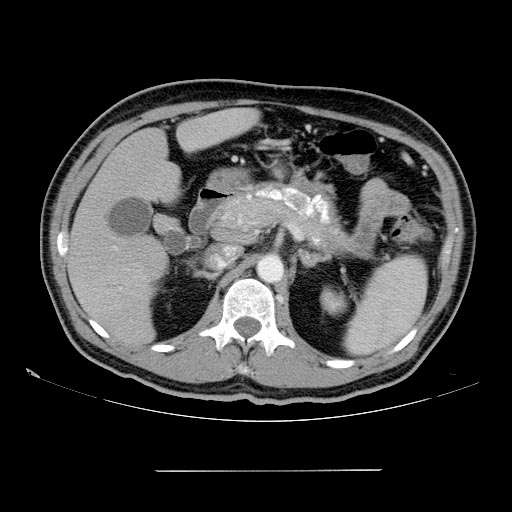Chronic pancreatitis (patient information): Difference between revisions
No edit summary |
m (Bot: Automated text replacement (-{{SIB}} + & -{{EH}} + & -{{EJ}} + & -{{Editor Help}} + & -{{Editor Join}} +)) |
||
| Line 107: | Line 107: | ||
[[Category:Gastroenterology patient information]] | [[Category:Gastroenterology patient information]] | ||
{{WH}} | {{WH}} | ||
{{WS}} | {{WS}} | ||
Revision as of 23:52, 8 August 2012
| Chronic pancreatitis (patient information) | |
 | |
|---|---|
| Chronic pancreatitis. Image courtesy of RadsWiki | |
| ICD-10 | K86.0-K86.1 |
| ICD-9 | 577.1 |
| OMIM | 167800 |
| DiseasesDB | 9559 |
| MedlinePlus | 000221 |
| eMedicine | med/1721 |
| MeSH | D050500 |
For the WikiDoc page for this topic, click here
Editor-In-Chief: C. Michael Gibson, M.S., M.D. [1]; Assistant Editor-in-Chief: Meagan E. Doherty
Overview
Chronic pancreatitis is swelling (inflammation) of the pancreas that leads to scarring and loss of function. The pancreas is an organ located behind the stomach that produces chemicals needed to digest food. It also produces the hormones insulin and glucagon.
What are the symptoms of Chronic pancreatitis?
Symptoms of Chronic pancreatitis include
- Abdominal pain
- Greatest in the upper abdomen
- May last from hours to days
- Eventually may be continuous
- May be worsened by eating or drinking
- May be worsened by drinking alcohol
- May spread (radiate) to the back
- Digestive problems
- Fatty stools
- Nausea and vomiting
- Pale or clay-colored stools
- Unintentional weight loss
The symptoms may become more frequent as the condition gets worse. The symptoms may mimic pancreatic cancer. Sitting up and leaning forward may sometimes relieve the abdominal pain of pancreatitis.
What are the causes of Chronic pancreatitis?
Chronic pancreatitis causes inflammation and scarring of tissue in the pancreas. This makes the pancreas unable to produce the right amount of chemicals (enzymes) needed to digest fat. It also interferes with insulin production, which may lead to diabetes.
The condition is most often caused by alcoholism and alcohol abuse. Sometimes the cause cannot be determined, however. Genetic causes have become more common. Other conditions have also been linked to chronic pancreatitis, such as:
- Chronic blockage of the pancreatic duct
- Injury
- Hyperlipidemia
- Hyperparathyroidism
Who is at risk for Chronic pancreatitis?
Chronic pancreatitis occurs more frequently in men than in women. This may be because alcohol-use disorders are more common in men.
How to know you have Chronic pancreatitis(Diagnosis)?
Chronic pancreatitis is often confused with acute pancreatitis because the symptoms are similar. As with acute pancreatitis, the doctor will conduct a thorough medical history and physical examination. Blood tests may help the doctor know if the pancreas is still making enough digestive enzymes, but sometimes these enzymes appear normal even though the person has chronic pancreatitis.
In more advanced stages of pancreatitis, when malabsorption and diabetes can occur, the doctor may order blood, urine, and stool tests to help diagnose chronic pancreatitis and monitor its progression.
After ordering x rays of the abdomen, the doctor will conduct one or more of the tests used to diagnose acute pancreatitis—abdominal ultrasound, CT scan, EUS, and MRCP.
When to seek urgent medical care
Call for an appointment with your health care provider if:
- You develop symptoms of pancreatitis
- You have pancreatitis and your symptoms worsen or do not improve with treatment
Treatment options
Treatment for chronic pancreatitis may require hospitalization for pain management, IV hydration, and nutritional support. Nasogastric feedings may be necessary for several weeks if the person continues to lose weight.
When a normal diet is resumed, the doctor may prescribe synthetic pancreatic enzymes if the pancreas does not secrete enough of its own. The enzymes should be taken with every meal to help the person digest food and regain some weight. The next step is to plan a nutritious diet that is low in fat and includes small, frequent meals. A dietitian can assist in developing a meal plan. Drinking plenty of fluids and limiting caffeinated beverages is also important.
People with chronic pancreatitis are strongly advised not to smoke or consume alcoholic beverages, even if the pancreatitis is mild or in the early stages
Diseases with similar symptoms
Where to find medical care for Chronic pancreatitis
Directions to Hospitals Treating Chronic pancreatitis
Prevention of Chronic pancreatitis
Determining the cause of acute pancreatitis and treating it promptly may help to prevent chronic pancreatitis. Avoiding heavy consumption of alcohol dramatically reduces the risk of developing this condition.
What to expect (Outlook/Prognosis)
This is a serious disease that may lead to disability and death. You can reduce the risk by avoiding alcohol.
Possible Complications
- Ascites
- Blockage (obstruction) of the small intestine or bile ducts
- Blood clot in the vein of the spleen
- Fluid collections in the pancreas (pancreatic pseudocysts) that may become infected
- Poor function of the pancreas
Sources
- http://www.nlm.nih.gov/medlineplus/ency/article/000221.htm
- http://digestive.niddk.nih.gov/ddiseases/pubs/pancreatitis/#chronic